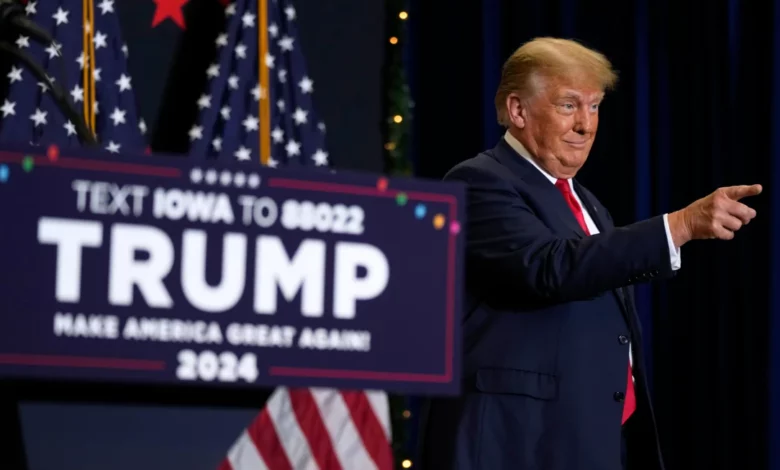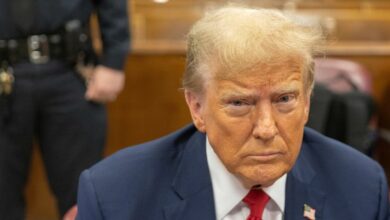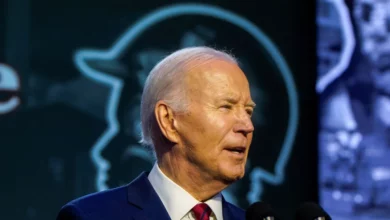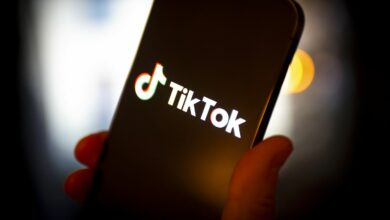
The 4-3 decision removes Trump from the Republican primary ballot in Colorado, which is scheduled for Super Tuesday in early March. However, the Colorado justices paused their ruling so Trump can appeal to the US Supreme Court, which could even preserve his spot on the state’s primary ballot if the appeal isn’t settled quickly.
In many ways, the landmark ruling holds Trump accountable for trying to overturn the 2020 election and provides a political punishment for his anti-democratic behavior. The ruling is also a massive vindication for the liberal groups and constitutional scholars of all stripes who championed such 14th Amendment lawsuits despite their long odds.
But Trump has mastered the art of converting legal setbacks into polling bounces. He’s already in a stronger position today to beat President Joe Biden than he was one year ago, before he was criminally indicted in four jurisdictions. And he and his GOP allies kicked into high gear Tuesday night, playing the victim card and railing against the ruling.
Here are the key takeaways from the decision and what comes next:
Trump engaged in insurrection, court says
The top Colorado court upheld the trial judge’s conclusions that the January 6 assault on the US Capitol was an insurrection and that Trump “engaged in” that insurrection.
These are key legal hurdles that the challengers needed to clear before Trump could be removed from any ballot, largely because the text of the 14th Amendment doesn’t actually define an “insurrection” or spell out what it means to “engage in” insurrection.
The justices also affirmed the decision that Trump’s January 6 speech at the Ellipse was not protected by the First Amendment. Trump has unsuccessfully pushed this argument in state and federal courts, which found that he incited violence when he told supporters to “walk down to the Capitol” and “fight like hell” to “take back our country.”
“President Trump incited and encouraged the use of violence and lawless action to disrupt the peaceful transfer of power,” the justices wrote in the 134-page majority opinion.
The ‘insurrectionist ban’ does apply to Trump
The justices broke from the trial judge on one key issue, reversing her controversial decision that the “insurrectionist ban” applies to every office except the presidency.
Section 3 of the 14th Amendment says oath-breaking insurrectionists can’t serve as senators, representatives, presidential electors, “or hold any office, civil or military, under the United States, or under any State.” But it doesn’t mention the presidency.
This textual vagueness is why the trial judge kept Trump on the 2024 ballot. But the high court disagreed. And this was the linchpin of their decision to disqualify Trump.
“It seems most likely that the Presidency is not specifically included because it is so evidently an ‘office,’” the court said, adding that “a conclusion that the Presidency is something other than an office ‘under’ the United States is fundamentally at odds with the idea that all government officials, including the President, serve ‘we the people.’”
The US Supreme Court will have the ultimate say
Everyone knows this isn’t the final word. The case is headed to the US Supreme Court.
It’s anyone’s guess how the justices will handle the case. How fast will they decide to take up the appeal? Will they hold oral arguments? How quickly will they issue a final decision? The answers to these questions will have implications for the political calendar, with the Iowa caucuses kicking off the GOP primary season in less than a month.
With the stunner coming out of Colorado, the dynamic has shifted. Trump is now on the losing side of the case, and he needs the nation’s top court to restore his spot on the ballot. That means he’s going to be asking the US Supreme Court – with its conservative supermajority, and with three justices he appointed – to keep his campaign alive.
“This is an extraordinary and unprecedented holding,” said Derek Muller, an election law expert at Notre Dame Law School who filed a brief in the case that provided legal analysis of the key questions at hand but was neutral on Trump’s eligibility.
“It puts Trump’s entire election campaign in serious legal jeopardy,” he added. “And the Supreme Court will be asked to hear this election-altering case, something I’m sure it has little appetite to hear.”
Paused ruling is good news for Trump
The ruling said if Trump appeals to the Supreme Court by January 4, which is a near certainty, then the decision will be paused until the nation’s highest court announces whether it will take the case – and, if it does, until it hands down its final decision.
January 4 is one day before state law requires Colorado Secretary of State Jena Griswold to certify the list of candidates for the March 5 Republican presidential primary.
Griswold, a Democrat, has said she believes Trump incited the insurrection but hasn’t taken a position on Trump’s eligibility under the 14th Amendment. She said Tuesday on CNN’s “Anderson Cooper 360” that she’ll “follow whatever court decision is in place.”
The Colorado justices said Griswold “will continue to be required to include President Trump’s name on the 2024 presidential primary ballot until the receipt of any order or mandate from the Supreme Court.” So even if he stays on the primary ballot, and wins the GOP nomination, that means he could still be disqualified for the general election – and every other state will be watching as it plays out.
Dissents offer path to Trump victory
The dissents from the sharply divided 4-3 court offer some legal foundations for Trump to overturn the historic ruling when he inevitably appeals to the US Supreme Court.
One justice concluded that a candidate shouldn’t be disqualified under the 14th Amendment if they haven’t been convicted of insurrection, which is a federal crime. (Trump is facing other felony charges, but not insurrection, in his federal election subversion case.) Another justice raised due process concerns and said only Congress has the power to enforce the ban. Trump previously raised some of these arguments in the case.
Even though Trump has bashed the seven-member court for only having Democratic appointees, his team is also embracing the dissents. Talking points circulated by the Trump campaign Tuesday highlighted a stinging comment from Justice Carlos Samour.
“I have been involved in the justice system for thirty-three years now, and what took place here doesn’t resemble anything I’ve seen in a courtroom,” Samour wrote in his dissent.
Colorado justices knew history was watching
The majority opinion acknowledged right off the bat that the case forced them to “travel in uncharted territory” and that the case “presents several issues of first impression.”
Indeed, judges have never weighed in on these questions because they never needed to. There has never before been even a remote possibility that a president-turned-insurrectionist would run for office again. The case provides yet another solemn reminder of how Trump made history by becoming the first president to try to stay in power after losing.
“We do not reach these conclusions lightly,” the majority wrote. “We are mindful of the magnitude and weight of the questions now before us. We are likewise mindful of our solemn duty to apply the law, without fear or favor, and without being swayed by public reaction to the decisions that the law mandates we reach.”
CNN’s Devan Cole, Holmes Lybrand and Alayna Treene contributed to this report.




